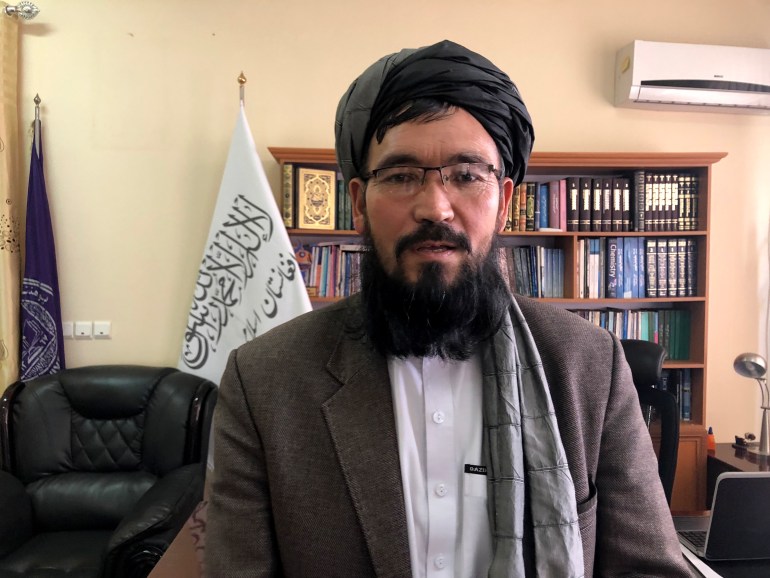HEAT (Western Afghanistan) -
Shuja Uddin Shahidzadeh and Naz Bhopal struggle with their presence on the university campus at 6 am, but the freezing weather with negative temperatures is not responsible for the frustrations they feel like other students of Asia Private University, but rather their lack of confidence in a better future in light of economic conditions deteriorating situation in Afghanistan.
Shuja al-Din expresses to Al Jazeera Net his lack of confidence in obtaining a job opportunity after graduating in the law specialization he is studying, and says that the economic situation is pressing on all aspects of life and its impact is clear with the inability of most students to pay university fees, which forced many of his colleagues to leave their studies.
As for Naz Popal, a student in the last semester of the Faculty of Law, she adds another reason for her female colleagues to leave their studies, which is their fear that they will not be allowed to work in their specialization, and she says that the families of the students feel the futility of educating them in areas that may not qualify them for the labor market, as is the case with wire The judiciary and the legal profession, and thus, some families - as Bhopal says - feel that it is better not to sacrifice the costs of university education for girls in light of difficult economic conditions.
Abdul Aziz Nomani, President of Herat University: The US government has shown its aggression against the Afghan people once again (Al-Jazeera)
Herat University
With the Ministry of Higher Education announcing the resumption of studies in public universities in two phases this February, university administrations do not hide that they find themselves facing the challenge of preventing the collapse of university education as a whole.
The President of Herat State University, Abdul Aziz Nomani, hopes that his administration will be able to overcome the teacher shortage crisis caused by the emigration of educational cadres abroad, and confirms that the Ministry of Higher Education has developed a plan to address all challenges such as the lack of professors by replacing the departing with new professors.
Insiders at Herat University estimated the number of professors who have abandoned the teaching profession there by more than 50 professors belonging to various disciplines and degrees, in addition to non-teaching employees and cadres, since the fall of the Ashraf Ghani government and the Taliban movement's accession to power last August.
Newly appointed professors at Herat University after a number of professors gave up the teaching profession there (Al-Jazeera)
Nomani adds that Herat University was established in 1988 in difficult circumstances similar to the conditions in which the country is currently experiencing, and it began with the College of Arts and Humanities and in rented buildings, and the teaching staff there were limited to holders of bachelor’s degrees, and none of them were holders of higher degrees from master’s and doctorate, but it overcame all challenges to become Today, it is the second largest university in Afghanistan after Kabul University, with 18 faculties and more than 10,000 students.
Nomani attributes what he described as the difficulties facing university education in Afghanistan to the US measures, which he said target the Afghan people.
He added that "the US government - with great regret - showed its aggression against the Afghan people once again, and by freezing the money of the Afghan people and besieging their economic wealth, it caused economic hardship for the people and disrupted projects and factories and pushed many to think of emigrating in order to seek job opportunities and a livelihood."
Some students of Herat University in Afghanistan, which includes 18 colleges and more than 10 thousand students (Al-Jazeera)
private universities
The administrations of private universities are unanimously concerned about the future of private university education due to the inability of students to pay tuition fees, given that the fees are the main funder of about 87 private universities in Afghanistan, including 9 universities in the city of Herat.
Dr. Najib Frever, President of Ghalib University (one of the most prominent private universities in Herat), estimates the percentage of those who have left their university at about 40%, either because they are unable to pay fees despite the 30% reduction, or with the aim of migrating to other countries in search of work they can From helping their families whose income has stopped or has declined significantly.
Most of the private universities have rented buildings, and with the decline in their revenues, they are facing financial difficulties (Al-Jazeera)
Dr. Freer adds to Al Jazeera Net that Ghaleb University and other private universities have taken measures to reduce the phenomenon of dropping out of school, including helping students search for work during the study period and changing university working hours to early morning and evening hours, so that students can reconcile work and study.
Ghaleb University has launched a psychological rehabilitation program for students under the slogan “Leaving studies is not a solution.” The university’s educational guidance officer, Dr. Farid Al-Harawi, says that the program has succeeded in convincing many students to abandon the idea of immigration, and he believes that there is an intentional promotion for the migration of qualified cadres and students with the aim of Keep Afghanistan in the cycle of failure.
Officials in private university education point out that the problem faced by these universities lies in the face of increasing expenses in exchange for the students’ inability to pay fees, especially since the vast majority of private universities work in rented buildings, and the depreciation of the Afghan currency worsened its situation, after two years From reeling due to the Corona pandemic, neither universities nor students were able to provide the means for distance learning.

